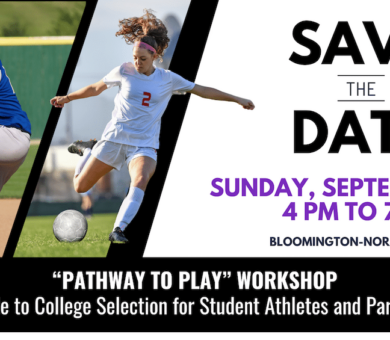Four Strategies For Parents Dealing With the Recruiting Process
Millions of parents and student-athletes navigate the recruiting process journey every year. Some are just starting out while others are deep in the thick of decision-making or narrowing for the final choice.
No matter where you and your child are with the recruiting process, there are going to be triumphs and letdowns, successes and failures, and uncertainties and chaos.
What makes this process so difficult for the parents?
The thing that makes the process difficult is all the unknowns that come with the process. You observe what others are doing and wonder if you and your child should be doing the same thing.
You listen to coaches and others tell you what you need to do, and you feel inadequate as a parent. You’re not sure who to trust or who to listen to. Everything is so expensive, and you’re not sure how to come up with all the money it takes to help your athlete become good enough to play college sports.
You feel pulled in 30 different directions because you are uncertain about what you should be doing with one child when you have others who need you as well.
Four Tips for Parents
The recruiting process gives parents headaches because they love their children and want them to be happy and successful. That’s a lot.
What can be done?
Comparing Won’t Help
It is so hard not to look at someone else’s process and relate it to your own.
Someone’s child has 5 college offers. Someone else has been to 14 ID or elite camps. Another family visited 10 college campuses in the last year.
And your child has nothing… yet. This can feel a little unnerving, and it’s human nature to view your own child’s journey through the lens of someone else’s process.
Solution: Understand that no two recruiting processes are the same.
What worked for one family is not a given for another family. Families have different needs and situations. For example, your student athlete may be a “late bloomer” whose talent is not recognized until later in high school. Or they may be an “early bloomer’” whose talent was recognized early on, but then capped out at an older age.
Needs and situations change for both student-athletes and colleges. Understanding this will help you keep it all in perspective.
Comparing does nothing but cloud your own child’s progress. Parents and student-athletes must stay focused on what the student-athlete desires out of a college experience so that parents can better help them find that place. If the athlete is not sure what they want, you can help them find out.

Taking Things Personally Is a Mistake
College coaches may drop your child right in the middle of the process, even when they are leaning toward that college. They may call and say they are moving in a different direction, and some may not call at all.
Coaches approach every student-athlete, every position on the roster, and every year differently. For example, a student athlete recruited on the college team last year filled a role that may not be needed in the current year. So the recruiting needs for the current year may be different.
Solution: Stay focused during the ups and downs.
Try to stay off the rollercoaster of emotions with all its highs and lows. Just remain committed to helping your athlete solve the puzzle of finding college fit.
Exposure Doesn’t Have to Drive
Your athlete’s exposure is important in the process, but it should not drive every single decision made about their recruiting process.
Finding a good travel team is important. Attending some exposure events is important. Going to some college camps may be useful, but all of these are expensive and time-consuming. You don’t have to become overwhelmed by all the opportunities and possibilities, saying “yes” to everything.
If you chase every single exposure opportunity, you could be adding up the miles and money without taking into consideration what is most important to you and your child.
Solution: Have a plan.
If you have a plan and know what your child is looking for, it’s easier to make decisions regarding exposure. You can then pick the opportunities that make sense for you and your family, instead of sending your athlete to every event possible.
It makes sense to have a plan.

Let Your Daughter Have Control
It can be scary allowing your child to do the work of finding a college for their career, academically and athletically. You may have financial concerns or have a strong desire for them to stay close to home or play at a certain level of college.
Your athlete might move away. They might not study what you think they should major in. They might go to a big campus when you feel they need a smaller one. You may fear for their safety at the campus they choose.
They may not make the right decision, in your mind.
Solution: Trust them. And let them know you do.
It’s true. Your athlete may make mistakes in the process, but the only way for them to have the best possibility and opportunity to find the right fit is to let them have control. Let them invest in themselves to do the work, and they WILL find a college that matches what they are looking for in a college experience.
By giving up this control, you are allowing your child the freedom to try on colleges and see what makes the most sense to them.
If your athlete does not have control, then the process is not theirs. If there is too much pressure or too many forced actions from parents or others, the athlete will not invest as much time in themselves. Instead, they’ll become distracted, frustrated, or angry, and it will affect the choices they make.
Demonstrate trust in them and voice your belief that they can do it.
Final Thoughts
Most importantly, parents can assist in the process of finding a college fit. Help your child find that place where they feel they can be successful in and away from sports, as well as in and away from academics. At the end of the day, who do they want to be, and what do they want to do when college is over? Which college can help them get there? With a laser focus on finding fit, parents and student-athletes are more prepared to make the right choices throughout the recruiting process.
The college experience is more about the people your child will meet, the connections they will make, and the education they will obtain. It’s more than just the sport they play.
When done successfully, your student athlete will find the place where they not only succeed in college, but also continue that success out in the real world when the college days are over.
Let them own it, but help them when they need you.


